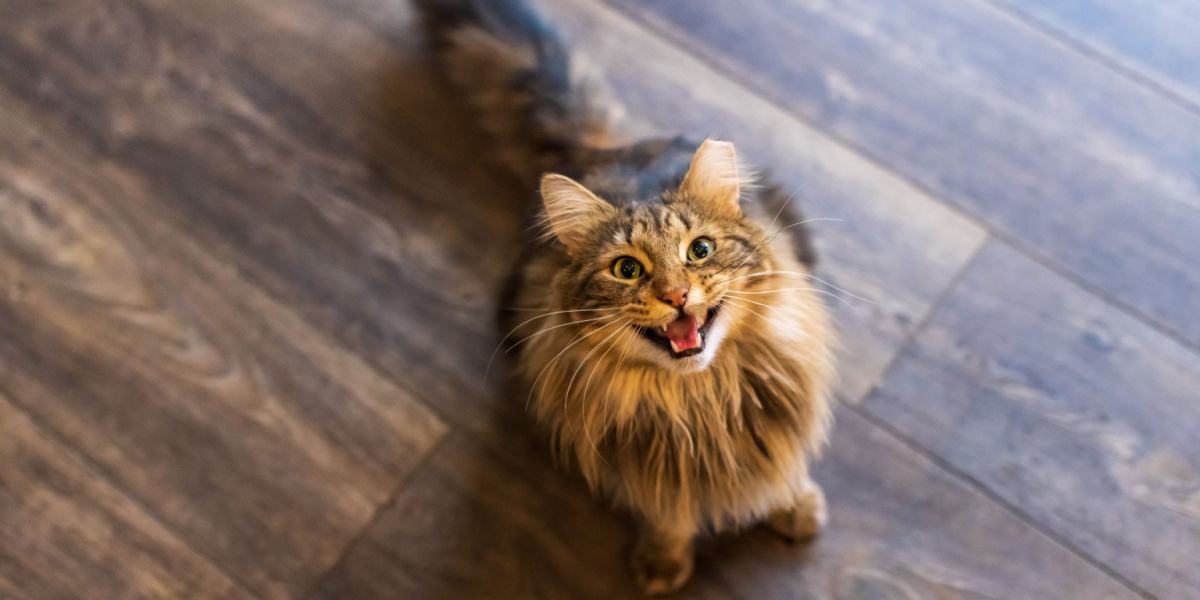
All cat owners will have heard their cat meow at some stage. Most cats will use their voices to communicate with both humans and other cats.
Some cats are very vocal and meow a lot; other cats are quieter and we rarely hear any noise from them. Some breeds of cats are generally more vocal than others, for example, Bengal cats or Siamese cats are notoriously noisy.
Key Takeaways
Cats meow for many different reasons. It is just one of the many ways they choose to communicate.
Female cats might meow a lot because they’re in heat, or because they are hungry, bored, stressed, in pain, or sick.
If your female cat suddenly starts meowing more than usual, this can be an indicator of a problem that might require a veterinary exam.
Individual differences are normal; the issue arises when your cat suddenly starts meowing more than usual. Here are the top seven reasons your female cat might start vocalizing more:
1. Your Cat Is In Heat
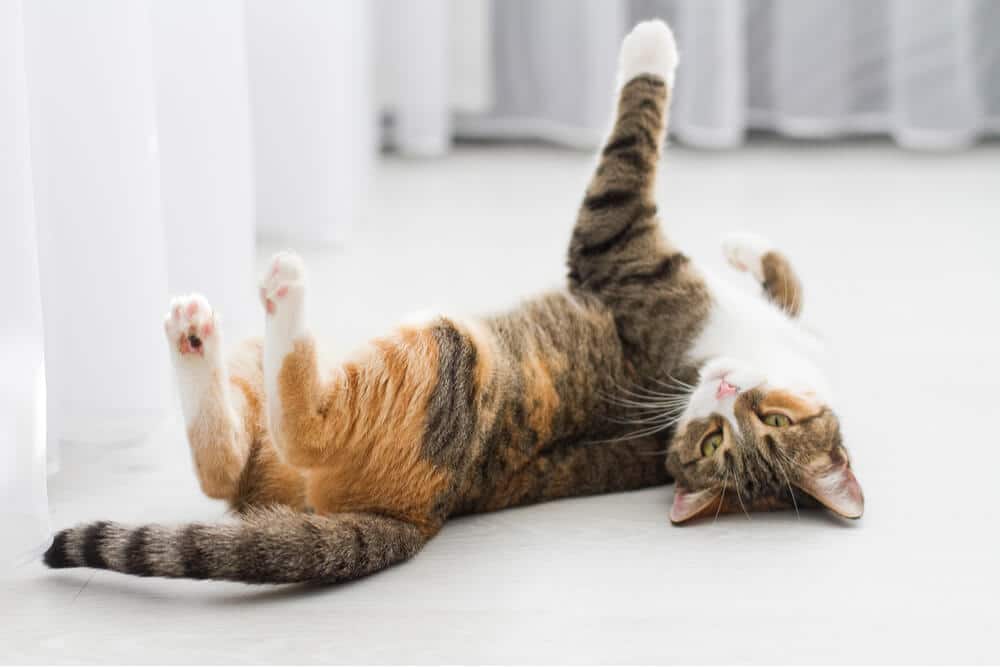
A female in heat might roll around on her back or stick her butt up in the air to attract potential mates.
If your unspayed female cat suddenly starts yowling, chances are she is in heat. The mating call of a cat is a very peculiar noise. It is aggressive and loud, and not very pleasant. Lots of owners mistake the noise for distress or pain, which can get very confusing.
If your cat is in heat, she will usually be very giddy and affectionate too, and rub herself against you a lot. If you go to stroke her on her back, she might arch her back and then stick her butt in the air in a position called lordosis. If a female cat is adopting the lordosis posture, this is a clear signal to males that she is inviting them to mate and giving them the green light. If she is doing this and meowing or yowling, you can assume she’s in heat.
Also Read: Do Cats Enjoy Sex Or Mating?
2. Boredom/Loneliness
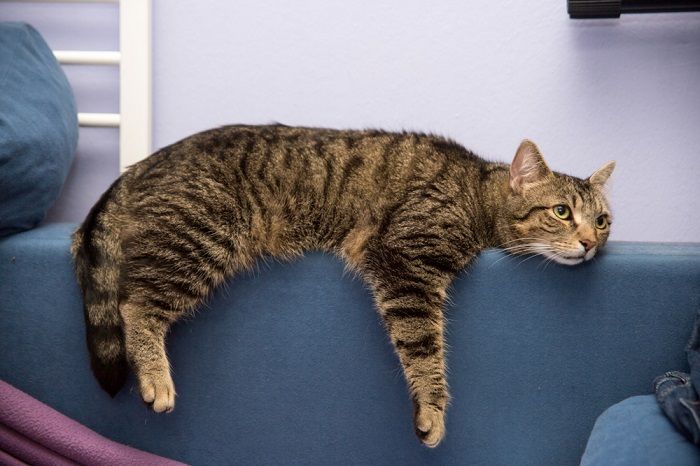
Bored or lonely cats might meow to get attention from you.
If your cat gets left on their own for a portion of the day, they could be lonely or bored. Constant meowing might be attention-seeking behavior. Some cats even get separation anxiety. You can try to combat boredom and loneliness by playing with them and giving them lots of attention and affection when you are home.
Also consider interactive toys that add enrichment to your cat’s environment. Another good idea is to rotate toys left out for your cat so that they don’t get used to playing with the same toy day in and day out.
You can try to positively reinforce good behavior by stroking them and fussing over them when they are calm, and ignoring them when they start meowing. This is not something that can be fixed overnight, but with a bit of time and patience, you reassure your cat that they aren’t being abandoned and that they are in a safe place.
Also Read: Is My Cat Bored? 8 Signs to Watch Out For
3. Hunger
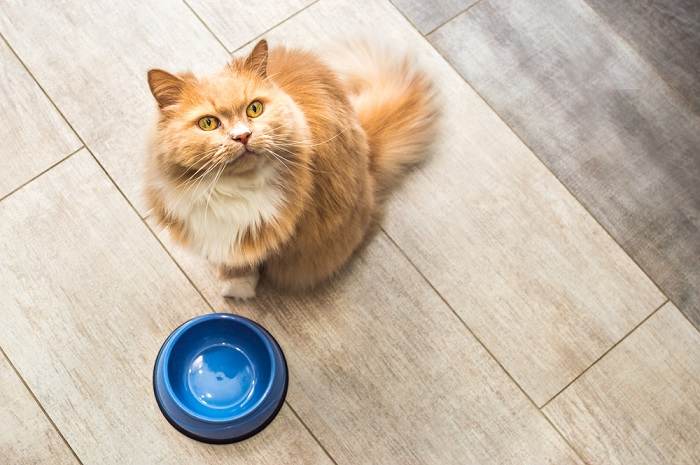
When the food bowl is empty, cats will try anything to let you know, including lots of vocalization.
This is a very common reason for your cat to start meowing excessively. This a reason a lot of humans can empathize with as quite a lot of us get very vocal when “hangry” too!
Keep a close eye on your cat’s weight and notice if there have been any dramatic changes recently. Ensure your cat is getting enough food and being fed at the right times. If you have more than one cat, make sure your cat isn’t being bullied away from the food bowl or not getting their fair share. If your cat is more of a grazer, feed them small meals at least four times a day but ideally six.
Note that your cat might be yowling either due to actual hunger or perceived hunger. They might not actually need feeding again. A few things such as hormone imbalances or certain drugs can affect appetite and your cat might be begging for food but not necessarily needing it.
Also Read: Cat Weight Calculator
4. Stress
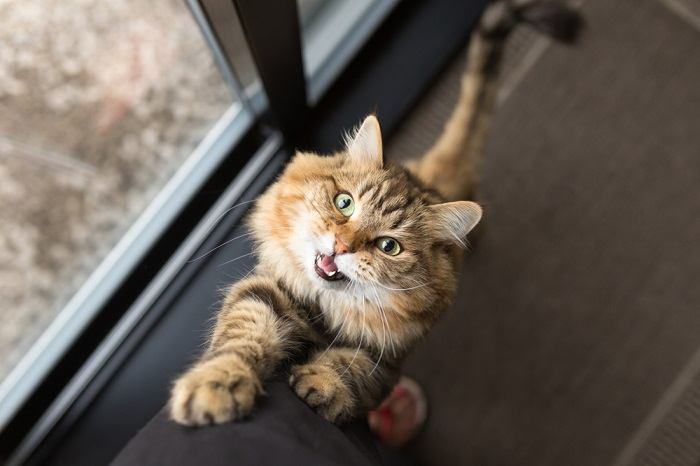
If something in your cat’s life is causing stress, they might try to communicate this with urgent meowing.
There are, unfortunately, many stressors in our home that can trigger our cats. If cats are feeling stressed, they will often vocalize loudly and frequently in an attempt to communicate their feelings.
The most common stressors are things like moving house, the introduction of a new family member (new pet or human), the loss of a family member, conflict with another cat, building work, or other random loud continuous noises.
Cats are very sensitive and intelligent and they do get affected even when little things change. Try to identify the source of the stress and then take measures to reduce or remove it for your cat if possible. (This is often easier said than done!)
Also Read: 7 Common Cat Vocalizations And What They Mean
5. Pain
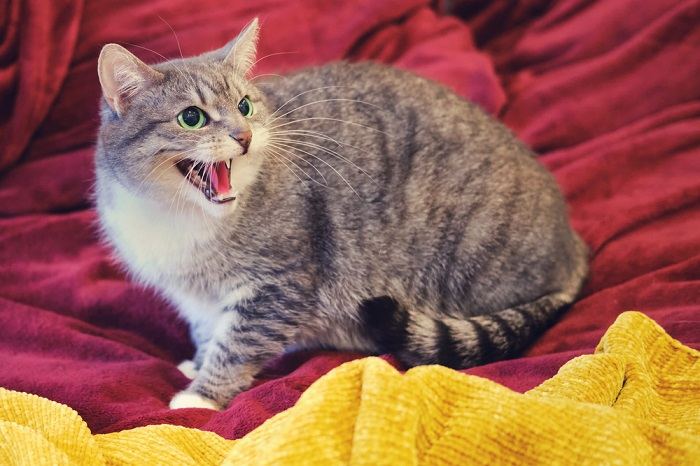
If your cat is meowing and hissing when you touch them, it could be related to pain.
Cats are usually very good at masking pain and in the wild, they tend not to show signs of pain as it is expressing a weakness to any potential predators. However, in a domestic setting, where you have bonded with your cat, they do sometimes like to vocalize to let you know they are hurt or suffering.
This is their way of alerting you that they are not happy. If they are in a great deal of pain, for example, a broken bone, they will yowl uncontrollably and become very stressed. If you have any reason to believe your cat is in pain, seek veterinary attention immediately.
Also Read: 12 Warning Signs Your Cat Is In Pain And Crying For Help
6. Illness
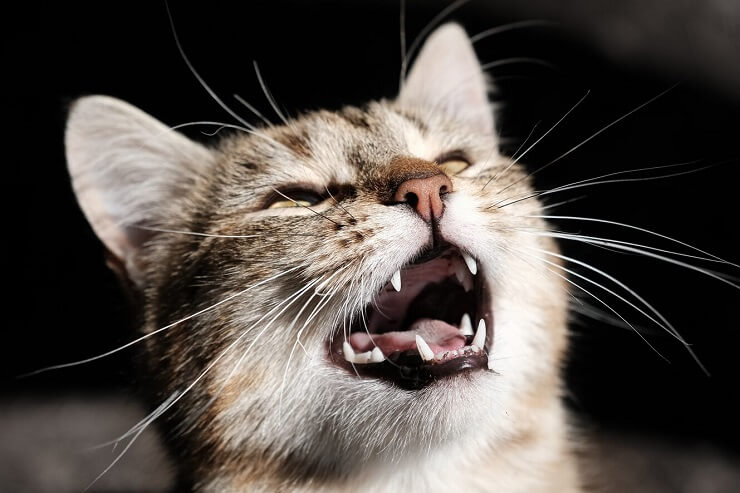
Excessive vocalization is associated with some medical conditions, such as hyperthyroidism.
Your cat might be affected by a medical problem. There are a few that cause them to start meowing or be more vocal. One of these is hyperthyroidism. This is caused by an overactive thyroid. This can be seen along with weight loss, aggressive behavior, and ravenous hunger.
Another one is feline lower urinary tract disease or cystitis. Cats can become very stressed when they are unable to pass urine freely in their litter box and they often vocalize to express their frustration and discomfort.
Conditions such as chronic kidney disease or diabetes can cause your cat to be excessively thirsty, in which case they would meow incessantly for more water and perhaps hang out constantly by the water bowl to try and communicate to you about their increased thirst.
Other issues such as a gastrointestinal disorder or intestinal parasites affecting your cat’s appetite can cause them to meow more, too.
Another condition that causes excessive vocalization is feline hyperesthesia syndrome. This is an unusual condition where cats are overly sensitive to touch and other stimuli. It can cause them to meow and yowl frequently. If you have any concerns about your cat’s health do not hesitate to contact your veterinarian.
Also Read: 10 Subtle Signs Your Cat May Be Sick
7. Feline Dementia
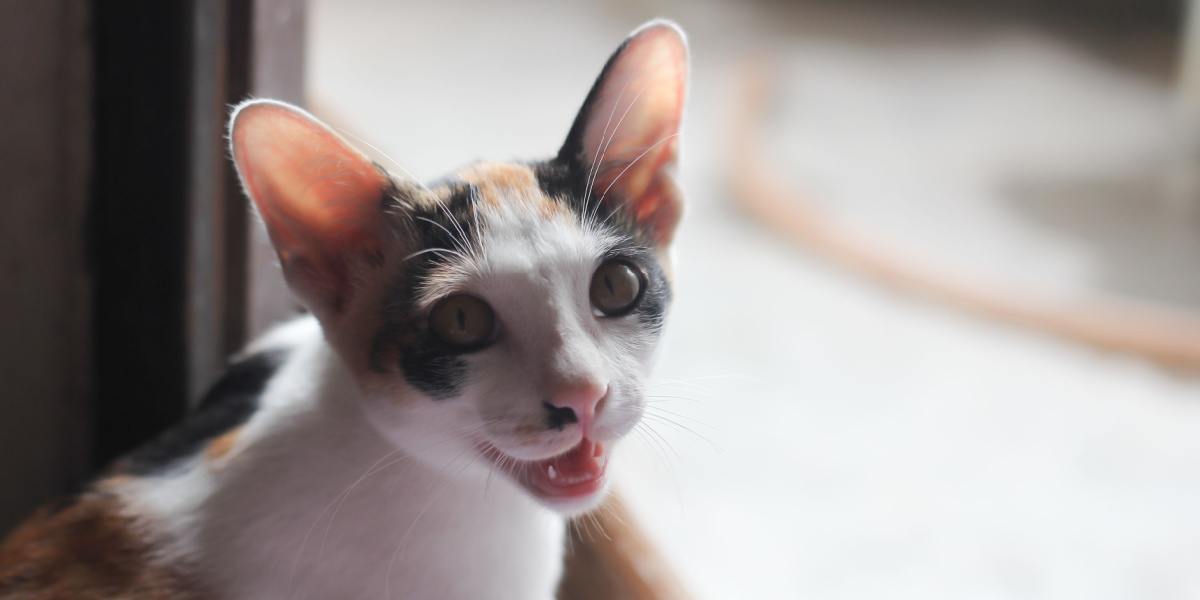
Older cats with feline cognitive dysfunction might become confused and meow more as a result.
Although it’s not documented in exactly the same way in cats as in humans, the brain tissue does deteriorate similarly. Older cats do go senile, or get cat dementia, which is also called feline cognitive dysfunction. This is not usually seen in kittens.
Feline dementia can result in a number of scenarios where your cat is confused or frightened. They usually respond by excessive meowing or yowling repeatedly. They might also be more irritable, have altered sleep patterns where they are awake when they used to sleep. They can become more clumsy and can go to the bathroom in unusual places, too.
The condition can cause disorientation and cats can cry often for no apparent reason, especially at night. A night light can sometimes help in this situation. Your vet can prescribe some medications, so it’s always worth getting your cat checked out.
If your cat is losing their sight or hearing, which often happens with old age, you might see similar signs as what has been described above. Sometimes in an older cat it’s difficult to differentiate between the problems when there are multiple things going on.
Also Read: Why Does Your Cat Yowl At Night & How Do You Get Them To Stop?
Monitor your cat’s behavior when they start to meow more to see if there are any clues as to what might be bothering them. As always, if you have even the slightest concern about your cat’s physical or mental well being, get them straight to your veterinarian so they can check them out.
Also Read: 10 Reasons Your Cat Won’t Stop Meowing At Night
Frequently Asked Questions
What does a cat meowing repeatedly at me mean?
If your cat is meowing directly at you incessantly, it does depend on the pitch of their meow. It could mean your cat is excited to see you. It might mean they are frightened or hurt. They might feel threatened or unhappy.
Look at their body language too as that can give you clues. If they are curled up on your lap and meowing, it’s likely they are content and happy to be in your company. If their hackles are up and their tail is in the air they are more likely to be angry or annoyed.
Why is my cat walking around meowing?
Many cats wonder about the house meowing if they are lonely or bored. Some might be doing it because they are hungry or thirsty. Some cats might want some attention.
If your cat regularly makes a habit of walking around the house vocalizing this might be completely normal for them. However, if they suddenly start doing this when they did not display this behavior before, that might indicate a problem and you should get your cat checked out by a vet.

